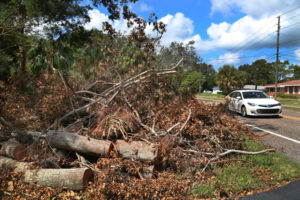
By Justine Griffin
Tampa Bay Times, Oct. 4, 2017
Allergies out of whack?
You can blame Hurricane Irma for that. Well, kind of.
As many continue to wait for cleanup crews to haul away the sopping piles of withering tree debris in front of their houses from Irma, plenty of people across Tampa Bay are sniffling and coughing more than they were before the hurricane passed, narrowly sparing the region from the worst of its wrath.
“I’ve been telling my patients that it seems like Irma brought the allergy season on a little earlier,” said Dr. Rachel Dawkins, a pediatrician at Johns Hopkins All Children’s Hospital in St. Petersburg. “We usually see the peak of it in the fall at the end of October and into November, when the trees start shedding their leaves. But right now we have a lot of trees on the ground, which means we have a lot of pollen on the ground, and there’s an uptick of mold from standing water.”
Read more here.

![First Green Bank, a community bank based in Orlando, is the first in Florida to work with licensed medical marijuana companies. [Photos courtesy of First Green Bank]](http://www.tampabay.com/storyimage/HI/20170831/ARTICLE/308319719/AR/0/AR-308319719.jpg)
![Patient Julie DiPietrantonio, 67, of St. Petersburg, is examined by Dr. Howard Riker of Tetra Health Care. DiPietrantonio suffers from chronic pain caused by spinal stenosis, degenerative arthritis, and sacroiliitis. She is looking for relief by using medical marijuana. [SCOTT KEELER | Times]](http://www.tampabay.com/storyimage/HI/20170727/ARTICLE/307279374/AR/0/AR-307279374.jpg)
![A developer has demolished the Sears store at Tyrone Square Mall and is replacing it with a Dick's Sporting Goods and Lucky's Market. [CHERIE DIEZ | Times]](http://www.tampabay.com/storyimage/HI/20170714/ARTICLE/307149515/AR/0/AR-307149515.jpg)